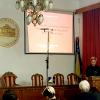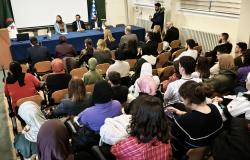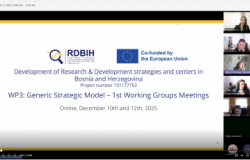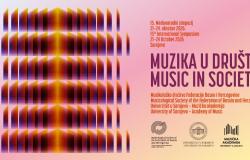A Lecture by Dr. Razia Sultanova “Non-Russian face of Russia: music, youth and migration in the post-Soviet State” Delivered
Ethnomusicologist Dr. Razia Sultanova from the University of Cambridge held an introductory lecture “Non-Russian Face of Russia: Music, Youth and Migration in the post-Soviet State” On October 26, 2018.
On behalf of UNSA Rector, Prof. Dr. Rifat Škrijelj, the welcome address to guests was delivered by Prof. Dr. Dženana Husremović, Vice-Rector for Research.
In the her lecture Dr. Sultanova said that the Soviet Union was the last major world empire with borders stretching from Europe to Asia, from the Arctic to the Pacific Ocean. Within these borders, there were 120 ethnic groups divided into fifteen republics and various autonomous provinces, with a total population of nearly 300 million. The Soviet Union was a multi-ethnic state, based on a strong state controlled system of cultural development and which as such gave priority to peaceful, polite cooperation between the Russian majority and the various minorities that were primarily living within the country's borders - at least in theory.
After the collapse of the USSR, non-Russian peoples faced many problems. Today, in the 21st century, due to political and economic processes, Central Asia sends up to 15-16 million migrant workers just to Russia. According to the latest official figures in Moscow, which is turning into “the largest European Muslim city”, there are about 2 million migrant workers. Where is the home today for those people? How do they manage to adapt culturally to eviction? How does art and music help them adapt to new places and a new way of life? So, how do the new political, economic and religious trends affect the musical culture of migrant workers? What is the correct way to research the current music scene of migrants in Russia? By relying on the geographically-based study of the social life of a number of musicians-migrants, in her work Dr. Sultanova explored the idea of national identity as a social category for those who found themselves inside and outside the Central Asian communities, thus providing an internal and external approach to this topic.
Dr. Razia Sultanova studied and then worked at the Tashkent and Moscow State Conservatory. She worked at the Soviet Composers Association and the Russian Institute for Art Studies in Moscow. When she moved to Great Britain in 1994, she worked at the University of London, and since 2008 at the University of Cambridge. She is the author of four books and an editor of four volumes (in Russian, French and English) about music in Central Asia, countries where Turkish is spoken on music and society. Her next monograph titled “Popular Culture in Afghanistan” is currently being published by UBTauris. She lectured as a visiting professor at the Moscow State Conservatory, the Kazakh National University of Arts (Astana) and the Kazakh-Turkish University of Khoya Ahmet Yassawi (Turkistan, Kazakhstan). Razia Sultanova was elected Vice-President of the International Traditional Music Council.
The lecture is a part of the symposium events within the 11th international symposium “Music in Society” organized by the Musicology Society of FBiH and the Music Academy of the University of Sarajevo.
After the lecture, a concert of traditional Bosnian and Herzegovinian music was performed by the Etnoakademik Ensemble.









